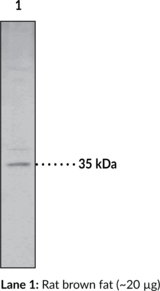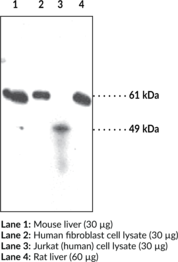Description
Akt1 and Akt2, also known as protein kinase Bα (PKBα) and PKBβ, respectively, are serine/threonine kinase belonging to the AGC kinase family and two of three Akt isoforms in mammals.{57326,59549} Akt kinases function downstream of activated tyrosine kinases and PI3K to regulate a variety of cellular processes, including cell size, growth, proliferation, and survival, as well as genome stability, glucose metabolism, and neovascularization.{59549} They are comprised of an N-terminal pleckstrin homology (PH) domain, which binds to phosphatidylinositol-(3,4,5)-triphosphate (PIP3) and phosphatidylinositol-(3,4)-diphosphate (PIP2), a kinase domain, and a C-terminal regulatory hydrophobic motif. Akt1 and Akt2 are ubiquitously expressed and are the primary isoforms in endothelial cells and insulin-responsive tissues, respectively.{15560} Akt1E17K is an activating mutation that has been found in tumor tissue isolated from patients with breast, colorectal, or ovarian cancer.{15097} Akt2E17K mutations have been found in patients with hypoglycemia.{57338} Cayman’s Akt1E17K/Akt2E17K Rabbit Monoclonal Antibody can be used for ELISA, immunohistochemistry (IHC), and Western blot (WB) applications.
Synonyms: PKBαE17K|PKBβE17K
Immunogen: Peptide corresponding to Akt1E17K/Akt2E17K
Formulation: 100 µg of protein A-affinity purified monoclonal antibody
Isotype: IgG
Applications: ELISA, IHC, WB
Origin:
Stability: 365 days
Application|ELISA||Application|Immunohistochemistry||Application|Western Blot||Product Type|Antibodies|Monoclonal Antibodies||Research Area|Cancer|Cell Signaling|PI3K/Akt/mTOR Signaling||Research Area|Cell Biology|Cell Signaling|PI3K/Akt/mTOR Signaling||Research Area|Endocrinology & Metabolism|Metabolic Diseases



